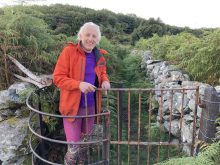Last week, I introduced you to James Deakin, the Founder of North Wales Recovery Communities (NWRC), and an interview he had with my Recovery Voices colleague Wulf Livingston. I was thrilled to edit this fascinating and informative interview into 13 short films totalling just under 80 minutes. Here is the 11th of these film clips [Apologies for the slow internet connection at one end]:
James describes activities of NWRC, eight years on from its initial development. It has a residence that houses 18 people, and provides a space for a larger group of people to engage in mutual aid groups daily. It organises outside activities, such as hill walking for recovering people. The Growing for Change project, with its gardens and allotments, engages community members in beneficial activities and provides food for local restaurants, including the community cafe Bwyd Da Bangor.

 On Friday 23 September, I left Gower and headed to Tregarth in North Wales, via Aberystwyth and Dolgellau (where one of my ancestors was born), to stay with Wulf Livingston and his lovely wife Melanie. As I had such a tight schedule, I was due to stay there only one day, but my cousin Emma (my next visit) had just tested positive for Covid, so I ended up staying two days with Wulf and Mel.
On Friday 23 September, I left Gower and headed to Tregarth in North Wales, via Aberystwyth and Dolgellau (where one of my ancestors was born), to stay with Wulf Livingston and his lovely wife Melanie. As I had such a tight schedule, I was due to stay there only one day, but my cousin Emma (my next visit) had just tested positive for Covid, so I ended up staying two days with Wulf and Mel.
